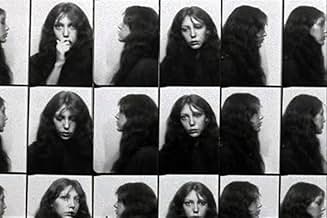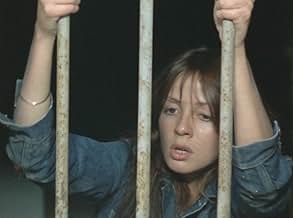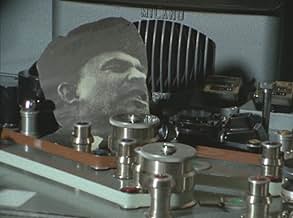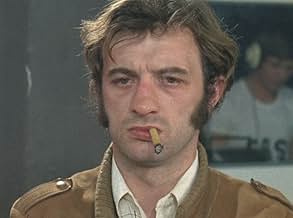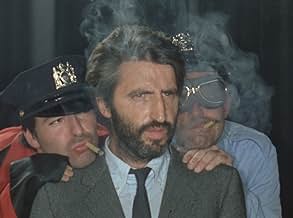Aggiungi una trama nella tua linguaIn Godard and Gorin's free interpretation of the Chicago Eight trial, Judge Hoffman becomes Judge Himmler (who doodles notes on Playboy centerfolds), the Chicago Eight become microcosms of F... Leggi tuttoIn Godard and Gorin's free interpretation of the Chicago Eight trial, Judge Hoffman becomes Judge Himmler (who doodles notes on Playboy centerfolds), the Chicago Eight become microcosms of French revolutionary society, and Godard and Gorin play Lenin and Karl Rosa, respectively, ... Leggi tuttoIn Godard and Gorin's free interpretation of the Chicago Eight trial, Judge Hoffman becomes Judge Himmler (who doodles notes on Playboy centerfolds), the Chicago Eight become microcosms of French revolutionary society, and Godard and Gorin play Lenin and Karl Rosa, respectively, discussing politics and how to show them through the cinema.
- Yves Alfonso
- (non citato nei titoli originali)
- Juliet Berto
- (non citato nei titoli originali)
- Bobby X
- (non citato nei titoli originali)
- Friedrich Vladimir
- (non citato nei titoli originali)
- …
- Karl Rosa
- (non citato nei titoli originali)
- …
- Judge Julius Himmler
- (non citato nei titoli originali)
- Dave Dellinger
- (non citato nei titoli originali)
- Anne Wiazemsky
- (non citato nei titoli originali)
Trama
Lo sapevi?
- ConnessioniEdited into Une jeunesse allemande (2015)
Firstly, perhaps I am luckier than when it was reviewed some years ago that I was able to see a rather good print streamed from Amazon - though it has to be said that Godard is not generally a slave to print quality preferring, as I think he once said, to make a film to have a discussion with the audience than to entertain.
Like much of Godard, it is not an 'easy' watch as the viewer is bombarded with so many ideas in such rapid succession. One might even wish to use a pause button to go over a few lines and examine the philosophical implications.
Vladimir et Rosa is usually grouped, quite understandably, with the 'political' period of Godard's work, yet it can also be viewed purely as cinematic, just as von Trier's Dogville is a work of art over and above any political interpretations. Godard (again from memory) has even disparaged such a label: the inference being that the material is simply used as a canvas with which to make a film and ask interesting questions. U.S. student protests against the U.S. Vietnam for instance, which form a backdrop to Vladimir et Rosa, are today very old news, and the "oppression of the majority by a minority" can be taken as any minority against a majority, not just within Western capitalism.
Even on a less philosophical level, Vladimir et Rosa has, I think, more accurately been described as a film about the theory of making political films politically.
This is further underlined by examining firstly oppression of black people and then, very acutely, oppression of women. In a most memorable scene, a woman is explaining to a man, presumably her loving partner, that even if he has read the feminist tract she has written, even if he 'understands' it, and even when he reads it out loud, he is not understanding it in the way that she has written or reads it. Sitting behind him, she gently but firmly takes his head in both her hands and instructs him to read it as he were her.
The film is even more relevant today (2020) in the wake of MeToo campaigns, and BlackLivesMatter campaigns -- with many men wanting to support women's rights and many white men and woman wanting to support black men and women's rights. It suggests an almost impossible leap to understand an issue from the opposite viewpoint, and the temerity, even with the best intentions, of claiming to do so in a knee-jerk fashion, especially (but not only) if one is part of the dominant colour/gender. (One could likewise compare it to the LGBT debates).
Is this enduring quality not, rather than the temporal association with the political situation and time depicted in the film, a sign of artistic greatness?
Having said that, anyone *not* familiar with the Chicago 7 (or Chicago 8 depending how they are counted) is well-advised to google it before watching. The film assumes the viewer is conversant with it, and with the political turmoil, protests and sometimes brutal suppression that occurred during that era of American history. History is it, and not a reflection of America generally, even if it is epitomized in the film in order to examine certain themes.
Finally, for enthusiasts who enjoy Godard's constant invention of technique, Vladimir et Rosa doesn't disappoint. From the now familiar Brechtian self-analysis and self-commentary, who else could turn a black screen into a symbolic work of art and justify with the dialogue as it is thrust down the viewer's throat? (In balance, the film also has one or two laugh-out-loud moments.) The words 'theorie' and 'pratique' are emblazoned across the screen and the dialectic continued as Godard and Gorin run back and forth across a tennis court discussing film-making while the bourgeois carry on their game, oblivious.
At one point, quite early on, we are confronted by graffiti written over a Marx Bros. poster saying, "Sometimes the first meaning of a film is not apparent until the second viewing."
Well said.
- Chris_Docker
- 6 ago 2020
- Permalink
I più visti
Dettagli
Contribuisci a questa pagina


